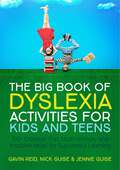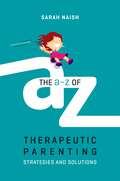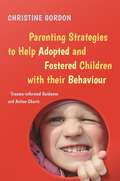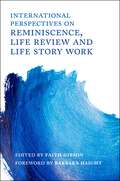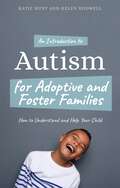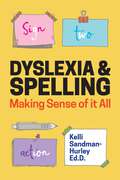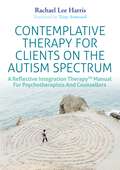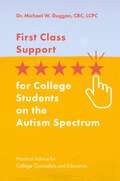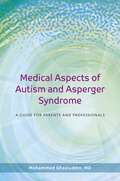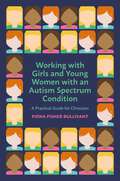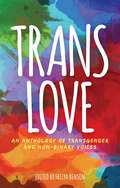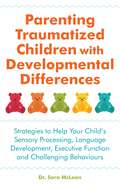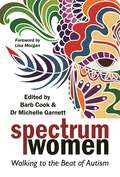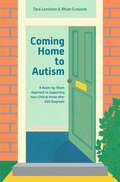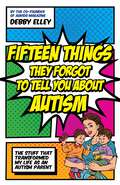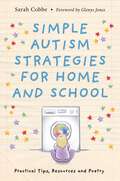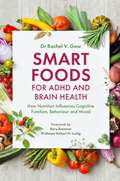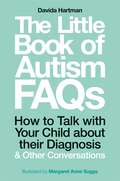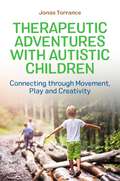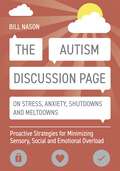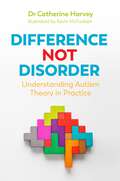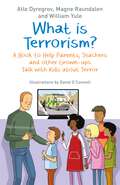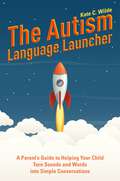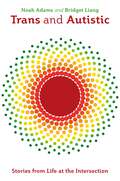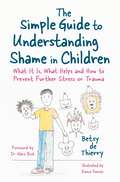- Table View
- List View
The Big Book of Dyslexia Activities for Kids and Teens: 100+ Creative, Fun, Multi-sensory and Inclusive Ideas for Successful Learning
by Gavin Reid Nick Guise Jennie GuisePacked with fun, creative and multi-sensory activities, this resource will help children and teenagers with dyslexia become successful learners across the curriculum.The authors provide over one hundred tried-and-tested fun and imaginative activities and ideas to unlock the learning of children and teenagers with dyslexia in creative ways. The book is split into parts addressing literacy, numeracy, learning and cross curricular subjects. With fun activities like 'Spelling Ping-Pong' and 'Class Got Talent', it focuses on key skills such as listening, memory, spelling, writing and key board skills.Each activity includes a 'red herring' that will keep dyslexic children and teenagers entertained, extending them in interesting ways that will appeal to those who think outside of the box. Brimming with imaginative ideas, The Big Book of Dyslexia Activities is an essential toolkit for any teacher or parent working with children and young people with dyslexia.
The A-Z of Therapeutic Parenting: Strategies and Solutions (Therapeutic Parenting Bks.)
by Sarah NaishTherapeutic parenting is a deeply nurturing parenting style, and is especially effective for children with attachment difficulties, or who experienced childhood trauma. This book provides everything you need to know in order to be able to effectively therapeutically parent. Providing a model of intervention, The A-Z of Therapeutic Parenting gives parents or caregivers an easy to follow process to use when responding to issues with their children. The following A-Z covers 60 common problems parents face, from acting aggressively to difficulties with sleep, with advice on what might trigger these issues, and how to respond. Easy to navigate and written in a straightforward style, this book is a 'must have' for all therapeutic parents.
Parenting Strategies to Help Adopted and Fostered Children with Their Behaviour: Trauma-Informed Guidance and Action Charts
by Christine Gordonxx
International Perspectives on Reminiscence, Life Review and Life Story Work
by Bob Woods Robyn Fivush Faith Gibson Peter G. Coleman Cheryl Svensson Christine Ivani-Chalian Maureen Robinson Christine Bryden Pam Schweitzer Kate De Medeiros Barbara Haight Thomas W. Pierce Ann N. Elliott Jordan Booker TsuAnn Kuo Elizabeth MacKinlay Emily Mroz Susan Bluck Brian De Vries Jeffrey D. Webster Philippe Cappeliez Sara Stemen Marian Ferguson Geraldine Gallagher Juliette Shellman Julia McNeil Gerben J. Westerhof Mary O'Brien Tyrrell Assumpta A. Ryan Loriena Yancura Esther GieschenExamining recent research and practice on reminiscence, life review and life story work, this book offers critical accounts of the rapidly growing and extensive global literature, and highlights the continuing relevance and effectiveness of these therapeutic methods.The book includes examples of international practical projects, involving people of all ages, life circumstances, and levels of physical and cognitive functioning. Contributions from contemporary practitioners and researchers give a nuanced appraisal of the methods of engagement and creativity arising from the purposeful recall of our personal pasts. Chapters include reviews of technology, ethical issues including end of life care, working with people with mental health conditions, and working with people with dementia.
An Introduction to Autism for Adoptive and Foster Families: How to Understand and Help Your Child
by Helen Rodwell Katie HuntWritten for busy foster carers and adoptive parents, this book provides a concise introduction to Autism Spectrum Disorder (ASD), and how to support a child with a diagnosis. It emphasises the common strengths children with ASD have, as well as offering strategies for any behavioural issues that are likely to arise, highlighting how these can be exacerbated by the care system and adoption process.The first part of the book looks at the different aspects of autism and the challenges it can pose for children and parents, providing strategies for managing difficulties at home and at school, using social stories, and reducing sensory input in a child's environment. The second part looks at issues that arise for fostered or adopted children, including placement transitions, contact, and explaining the past. It concludes with helping parents to think about self-care.
Dyslexia and Spelling: Making Sense of It All
by Kelli Sandman-HurleyWritten by an authority in the dyslexia field, this is the first accessible guide to the close interplay of spelling and dyslexia. Kelli Sandman-Hurley talks the teacher or parent through why kids with dyslexia find spelling so hard, and what we can learn from the spelling mistakes in their writing samples. Introducing key terminology around morphemes (smallest unit of meaning in words) and phonemes (smallest contrastive units in language) in an accessible and clear way, Sandman-Hurley goes on to explain how we can identify, and learn from, kids' spelling miscues, and use them to further inform our teaching and instruction. Shedding much-needed light on an under-explored tool for classroom or home learning, Dyslexia and Spelling is essential reading for teachers and parents alike.
Contemplative Therapy for Clients on the Autism Spectrum: A Reflective Integration Therapy™ Manual for Psychotherapists and Counsellors
by Tony Attwood Rachael Lee HarrisDrawing on the ancient tradition of contemplation, Reflective Integration Therapy™ shows how mantra meditation and reflective therapy can be used with clients with high functioning autism. The Reflective Integration Therapy™ programme uses the cognitive differences in those with autism, such as their innate capacity for silence, withdrawal, intense focus and repetition as sources of therapeutic healing. This manual introduces this fresh, unique therapeutic approach, creating an essential resource for all practitioners working in the field of autism. All the material for twelve weekly sessions of therapy is included within the book.
First Class Support for College Students on the Autism Spectrum: Practical Advice for College Counselors and Educators
by Michael W. DugganCollege students with autism can face many difficulties during the transition from high school to further education and beyond. Highlighting the various everyday issues that may arise, this book shares practical advice for supporting students on the autism spectrum and helping them to succeed not only academically, but also socially and emotionally. From supporting students with their relationships, to dealing with anxiety and managing independent living, this book covers a breadth of topics. It considers the impact of teaching expectations in higher learning on general adult life, and how to counsel students with autism on academic issues. The author also examines his many years of experience as a community college counselor, sharing the mistakes he has made and the lessons learned, to outline what makes a good counselor and how to take specific steps to ensure success for students with autism in all aspects of college life.
Medical Aspects of Autism and Asperger Syndrome: A Guide for Parents and Professionals
by Mohammad GhaziuddinPeople with autism are at a higher risk of having additional medical conditions, so increased care should be taken to ensure any other needs are detected early and effectively managed. This book is the perfect aid for doing so, providing detailed information on the range of possible further conditions, including epilepsy, eating disorders or genetic conditions. Written for both parents and practitioners, including students, it shows how these medical conditions can be identified, and explains the range of possible treatments that are available that may improve the quality of life of the affected person.
Working with Girls and Young Women with an Autism Spectrum Condition: A Practical Guide for Clinicians
by Fiona Fisher BullivantThis guide shows how clinicians can help girls and young women with ASC to reach their full potential, by adopting more relationship-based, individualised approaches. With contributions from young women about their experiences in clinical settings, the book reflects on what clinicians have done right and wrong to date, why girls and women with ASC are too often misunderstood, and how the culture of how clinicians work with them needs to change in order to achieve better results. In a concise and practical way, it covers how to better understand clients' needs and foster strong relationships through diagnosis, understanding comorbidities, sensory issues, self-harm, emotional regulation, assessments, interventions and strategies.
Trans Love: An Anthology of Transgender and Non-Binary Voices
by Freiya BensonSelected as a 2019 LGBT Book of the Year by Dazed and Ms. MagazineA ground-breaking anthology of writing on the topic of love, written by trans and non-binary people who share their thoughts, feelings and experiences of love in all its guises. The collection spans familial, romantic, spiritual and self-love as well as friendships and ally love, to provide a broad and honest understanding of how trans people navigate love and relationships, and what love means to them.Reclaiming what love means to trans people, this book provokes conversations that are not reflected in what is presently written, moving the narrative around trans identities away from sensationalism. At once intimate and radical, and both humorous and poignant, this book is for anyone who has loved, who is in love, and who is looking for love.
Parenting Traumatized Children with Developmental Differences: Strategies to Help Your Child's Sensory Processing, Language Development, Executive Function and Challenging Behaviours
by Sara McLeanChildren who have encountered trauma early in life can experience real differences in their social and cognitive development. This comprehensive guide introduces what such developmental difference means, how it affects a child, and offers strategies to help support or alleviate problems that commonly arise.Dr. McLean explains how children with developmental differences understand the world around them and offers easy to use techniques to help children with sensory and emotional regulation difficulties or delays in language, communication or memory development. This book will provide you with the knowledge and confidence you need to meet your own child's individual needs, and to help them to flourish.
Spectrum Women: Walking to the Beat of Autism
by Liane Holliday Willey Jeanette Purkis Michelle Garnett Anita Lesko Lisa Morgan Dena Gassner Christine Jenkins Artemisia Barb Cook Jen Elcheson Catriona Stewart Samantha Craft Kate Ross Becca Lory Renata Jurkevythz Terri Mayne Maura CampbellBarb Cook and 14 other autistic women describe life from a female autistic perspective, and present empowering, helpful and supportive insights from their personal experience for fellow autistic women. Michelle Garnett's comments validate and expand the experiences described from a clinician's perspective, and provide extensive recommendations.Autistic advocates including Liane Holliday Willey, Anita Lesko, Jeanette Purkis, Artemisia and Samantha Craft offer their personal guidance on significant issues that particularly affect women, as well as those that are more general to autism. Contributors cover issues including growing up, identity, diversity, parenting, independence and self-care amongst many others. With great contributions from exceptional women, this is a truly well-rounded collection of knowledge and sage advice for any woman with autism.
Coming Home to Autism: A Room-by-Room Approach to Supporting Your Child at Home after ASD Diagnosis
by Tara Leniston Rhian GroundsWhat does an autism diagnosis mean for everyday family life? Explore different rooms in the home to better understand how children with autism experience daily activities, and what you can do to support their development. · Head to the bathroom for guidance on toilet training and introducing a calming bath time ritual. · Discover how to create a safe haven for your child in the bedroom chapter, with tips to try before bedtime to help ease anxiety. · Learn how to transform any corner of your home into a special place for sensory play, fun and learning · Settle down in the parents' corner for top advice on remaining cool, calm and collected in the face of obstacles. Co-written by a mum and a speech-language therapist, and with many more rooms to visit, this book breaks down the information that you need to know to support children with autism at home.
Fifteen Things They Forgot to Tell You About Autism: The Stuff That Transformed My Life as an Autism Parent
by Debby ElleyWhat if the things people need to know about autism is not the information they're getting? Combining myth-busting advice with personal experience, this book from the mother of autistic twins shares simple strategies to build children's confidence, communication, and independence. From sharing the joy of yodelling around shops at the weekend, to finding creative ways to communicate with both her verbal and her non-verbal sons, Debby Elley gives practical and fun tips for everyday living and shows that being autistic is just another way of being. Both witty and candid, the book discusses labels, meltdowns, acceptance, happiness and much more.
Simple Autism Strategies for Home and School: Practical Tips, Resources and Poetry
by Sarah CobbeOffering a unique overview of a child's point of view of life with autism, this guidebook will help parents and teachers better understand how this condition is experienced in day to day life. Organised by topic for easy reference, it explores the issues that can arise in everyday situations from toilet training to homework.Learning points, situation-specific activities, and further resources offer practical guidance, while discussion tools such as original poetry illustrate the perspectives of children with autism. Concise and accessible, this book takes a creative approach to understanding autism, and will be an invaluable reference book.
Smart Foods for ADHD and Brain Health: How Nutrition Influences Cognitive Function, Behaviour and Mood
by Rachel GowChanging one's diet not only improves physical health, but benefits mood, behaviour and cognitive function at a fundamental level. This book highlights the link between nutrition and mental health and demonstrates the crucial role of diet in supporting individuals with ADHD. Written by an internationally-recognised leader in the growing field of nutritional psychiatry, Dr Rachel Gow takes a nutrition-based look at ADHD and its management. Combining the latest research with the inspirational stories of a range of professionals and individuals whose lives have been touched by the issues raised, this book also includes accessible tips throughout and a chapter of recipes to promote brain health. This is an essential guide to understanding the interplay of brain health and nutrition, and supporting families to build a diet that optimises brain function and health.
The Little Book of Autism FAQs: How to Talk with Your Child about their Diagnosis and Other Conversations
by Davida HartmanEmpowering and practical, this guide is the perfect companion for parents who are finding it difficult to tell their children about their autism diagnosis. It provides a realistic yet uplifting approach to autism, treating it not as a disability but as a difference.Not telling children about their autism diagnosis can have a significant negative impact on their mental health; by equipping parents with a language of positivity around autism, the book will make a difference to many children on the spectrum. It advises on how and when to talk to autistic children with both high and low care needs, and provides guidance on supporting children's relationships with peers at school, as well as how to broach the conversation with the child's siblings.Concise and easy to read, The Little Book of Autism FAQs answers parents' questions with accessible language, preparing them to approach this difficult conversation in a constructive manner.
Therapeutic Adventures with Autistic Children: Connecting through Movement, Play and Creativity
by Jonas TorranceA vivid exploration of working with autistic children using empowering techniques from a range of creative therapies. Each chapter in this heartening book is the story of a child with autism and how therapy was pivotal in confronting his or her individual dilemma. Covering many of the behaviours characteristic to autism, such as uncontrolled anger and obsessive tendencies, the therapies used range from drawing and dancing to meditation and martial arts, depending on the needs and interests of each child. The key message is that investing in the relationship between the therapist and the child - so that they grow, play and develop together - is transformative.
The Autism Discussion Page on Stress, Anxiety, Shutdowns and Meltdowns: Proactive Strategies for Minimizing Sensory, Social and Emotional Overload
by Bill NasonAnxiety, meltdowns and emotional regulation can be hugely challenging for autistic people. This book is full of proactive strategies for understanding, accepting and respecting the processing differences in autism. It contains tools for reducing sensory, social and mental drain, and offers strategies to protect from ongoing stress and anxiety. These help minimize shutdowns and burnout, while maximizing self-esteem, autistic identity and mental health.Learn strategies for matching environmental demands to the person's processing needs, how to support vulnerabilities, and how to prevent and manage meltdowns while protecting the identify and self-esteem of the individual with autism.
Difference Not Disorder: Understanding Autism Theory in Practice
by Dr Catherine Harvey Kevin McFaddenInterventions and educational approaches for children with autism spectrum disorders have developed in response to the different models for how autism has been constructed and understood. This book explores the evolving theories on autism and how these have impacted the interventions and outcomes in education. Drawing on 30 years of professional experience and detailed research, Harvey exposes the myths around autism, advocates for understanding autism as difference rather than impairment, and provides practical guidance on teaching and learning, behaviour management, addressing sensory and physical needs of children with ASD. This accessible overview shows how to put autism research into practice, learn from historic mistakes and create the most supportive environment for children on the autism spectrum.
What is Terrorism?: A Book to Help Parents, Teachers and other Grown-ups Talk with Kids about Terror
by Atle Dyregrov Magne Raundalen William YuleTerror acts have taken place in several countries recently, and the media attention they generate means that children are more exposed to hearing about terrorism than ever before. Using simple language suited to children aged 7+, this book is designed for an adult to read along with a child to help ease their misunderstanding and fear.The authors, who are child psychologists, tackle a broad range of important but difficult questions with consideration, including: Why do some people and groups use terrorism? What are adults doing to prevent societies being hurt by terrorism? And what can we do when we feel worried and afraid?An honest and helpful guide to talking about terrorism with children aged 7+, this reassuring book helps adults address children's questions and concerns, in a society where children are unfortunately increasingly aware to it.
The Autism Language Launcher: A Parent's Guide to Helping Your Child Turn Sounds and Words into Simple Conversations
by Kate WildeDo you want to help your child on the autism spectrum to verbally communicate with you and others?You've picked up the right book.The Autism Language Launcher gives you something totally new: a step-by-step guide that ignites language lift-off by using methods such as tapping into your child's innate intelligence, going with your child instead of against your child and providing techniques that work with adults on the spectrum.Written for parents, relatives, professionals, educators, or caregivers of a child or adult who is not yet verbal, making some sounds, using some words, speaking in single words, or using two-word phrases, this book uses the author's decades of experience with children and adults on the spectrum.Kate also demonstrates how to effectively address your child's echolalia, repetitious language, and repetitive questions in a way that your child will find supportive, bonding, and even joyful. Ultimately, this book shows you how to make language happen.
Trans and Autistic: Stories from Life at the Intersection
by Noah Adams Bridget LiangThis ground-breaking book foregrounds the voices of autistic trans people as they speak candidly about how their autism and gender identity intersects and the impact this has on their life.Drawing upon a wealth of interviews with transgender people on the autism spectrum, the book explores experiences of coming out, with self-discovery, healthcare, family, work, religion and community support, to help dispel common misunderstandings around gender identity and autism, whilst allowing autistic trans people to see their own neurodiverse experiences reflected in these interviews.An incisive introduction clearly sets out up-to-date research and thinking, before each chapter draws together key findings from the interviews, along with advice and support for those providing support to autistic trans individuals. Both accessible and authoritative, Trans and Autistic is an essential publication for autistic trans people, their families, and professionals wanting to understand and support their clients better.
The Simple Guide to Understanding Shame in Children: What It Is, What Helps and How to Prevent Further Stress or Trauma
by Emma Reeves Betsy de de Thierry· What is shame?· How does it affect children?· How can adults help?The perfect starting point for any adult or carer working with children who have experienced shame, this guide provides straightforward answers and explanations to both common and complex questions.At a time when children are more likely than ever to experience shame, the accessible advice in this book helps adults to boost children's self-esteem. Betsy de Thierry navigates the need to understand its impact and the reasons behind it, as well as how to reduce its hold on self-confidence. Reassuring advice will also help revitalize adults' abilities to face the challenges of supporting children affected by shame. It will teach them how to restore self-esteem.
